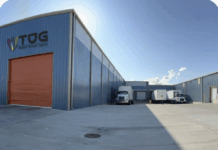
From V-8 engines to EV buses, Alabama’s automotive endeavors seized the road in 2024. Vehicular manufacturing increasingly demanded cutting edge technology and Alabama accepted the challenge.
In 2025 Alabama’s auto industry is not pumping the brakes. Production lines are staffed with thousands of skilled workers assisted by hundreds of methodical robots. Collectively, they turn out cars, trucks and engines by the thousands — daily. Indeed, the demand is great.
Mercedes-Benz
Tuscaloosa-based Mercedes-Benz U.S. International Inc. (MBUSI) celebrated in December the 30th year since its founding in 1995.
Production at the plant, the first major automotive manufacturing plant ever to be located in Alabama, began in May 1997. The move helped draw numerous additional OEMs, automotive suppliers and supporting businesses to the state in the following decades. So far, MBUSI has invested $7 billion here. That includes a $1 billion investment to start the production of electric passenger cars, expand the plant’s logistics activities and build a battery plant, which opened in nearby Bibb County in March 2022.
The Alabama plant, which employs about 6,100 workers, plans to continue its tradition of serving as the worldwide site for the production for large luxury SUVs including the GLE, GLS and GLE Coupe sport utility vehicles, in addition to the Mercedes-Maybach GLS. Added to the plant’s production in recent years are the all-electric Mercedes-EQ models, the EQE SUV and EQS SUV, as well as the Mercedes Maybach EQS SUV.
More than 295,000 vehicles were produced at the plant in 2023 with a total of more than 4 million vehicles built since 1997. About two thirds of MUSBI’s SUVs are being exported to almost every country in the world. Currently there are more than 180 direct suppliers in the United States for MBUSI alone.
MBUSI President and Chief Executive Officer Federico Kochlowski has an ambitious vision for the coming year. “Initiatives for 2025 are the renewal of key equipment with new investment, the preparation and implementation of new processes along with training of the team members, and a continued effort to improve our operations to benchmark levels,” he says.
Mazda Toyota
Mazda Toyota Manufacturing USA began production on Sept. 30, 2021. After three years of production, the plant has celebrated several milestones.
When MTM began mass production with its Apollo line in 2021, the plant started with the Toyota Corolla Cross, a crossover offering comfort and utility in a compact package. Within a few months, the plant began producing the Mazda CX-50 in January 2022 on its Discovery line. The two side-by-side lines, Apollo and Discovery, are named as a tribute to Huntsville’s role in the U.S. space program.
In 2022, MTM added a second shift on its Apollo line, and a year later, the plant added a second shift on the Discovery line. After adding second shifts on both lines, the facility reached its goal of employing more than 4,000 workers.
Now the plant also has launched Hybrid Electric Vehicle versions of both the Corolla Cross and CX-50. In December 2024, MTM built its 300,000th Corolla Cross, and the CX-50 will not be far behind, according to a spokesperson for the company.
“We have continued to make improvements and increase our team’s ability to assemble vehicles for both Mazda and Toyota,” says Mitsunobu Mukaida, who was named president of the organization in April 2024.
“However, our greatest success is always in our team members, whether it is their ability to build quality vehicles, or their ability to grow at MTM and provide a better life for their families.”
Hyundai Motor Manufacturing Alabama
HMMA’s grand opening took place on May 20, 2005. At the time, Mong-Koo Chung, the chairman and chief executive officer of Hyundai Kia Automotive Group, then Alabama Gov. Bob Riley, and other state officials came together at the $1.1 billion plant to recognize the start of a new era for Montgomery and Alabama.
Back then, the 2 million-square-foot manufacturing plant sat on 1,744 acres and employed 2,000 team members.
This year, in 2025, Hyundai Motor Manufacturing Alabama President and CEO Chris Susock and team members are getting ready to celebrate two decades of operation in Montgomery.
“We’re still in the process of planning our 20th anniversary events that will allow our team members, their families, and state and local community leaders to celebrate this important milestone in the history of HMMA,” said Scott Posey, HMMA’s public relations team manager.
“While I can’t share specifics at this time,” says Posey, “I can say it will be a celebration worthy of the incredible impact that HMMA has had on the River Region and the state and worthy of the incredible contribution that our team members have made to its success over the past 20 years.”
In 2024, the team at HMMA assembled a total of 335,516 vehicles. Specifically, HMMA production numbers are as follows: Tucson, 140,818; the Santa Fe, 103,947; the Santa Fe HEV, 37,043; the Santa Cruz, 30,512; the GV70 EV, 2,863; and the GV70, 20,333.
Hyundai Motor America distributes the vehicles HMMA produces and ships them across the United States. The vehicles are then sold and serviced by more than 830 Hyundai dealerships across North America.
Toyota Motor Manufacturing Alabama
With more than 2,400 employees on 403 acres in its Huntsville plant, Toyota Motor Manufacturing, Alabama Inc. (TMMAL) assembles 4-cylinder and V-6 engines. The V-6 motors power Toyota’s Tacoma and Tundra trucks and Sequoia SUVs. The 4-cylinder engines power the Camry, RAV4, Sienna and Highlander brands.
Alabama’s Toyota team members built 895,000 hybrid and combustion engines in 2024.
Since breaking ground in 2001 on a Huntsville cotton field, TMMAL has become the company’s engine capital of North America. In 24 years, the Alabama site grew from an initial workforce of 300 to 2,000.
The first engine rolled out in 2003. To date, the manufacturing center has expanded numerous times and is now home to a $1.7 billion production facility.
The Alabama team has assembled more than 10 million engines.
In the quest to build engines, Toyota’s workers lend a helping hand to non-humans. The team works in collaboration with production line robotics, which helps ensure safety, reduce fatigue and increase efficiency. Robots also complete repetitive production tasks such as moving parts. The automated robotic functions are programed by the Toyota Alabama employees.

Honda Alabama
2024 was one of the busiest ever at Honda’s Alabama plant in Lincoln. With 4,500 associates operating production lines at full capacity, Honda met strong customer demand.
Three models built in Alabama — Passport, Odyssey and Ridgeline — rank in the top 10 of the Cars.com American Made Index, with the Passport at number two, Odyssey at number five and Ridgeline at number six.
The Ridgeline was ranked by cars.com as the most American-made truck for the fourth consecutive year, while the all-new Honda Pilot was also in the Top 15 on that same list.
In April, Honda’s newest engine assembly facility reached a new milestone, producing its 3 millionth engine. When combined with the previous line that debuted in 2001, Alabama associates have produced more than 6 million engines.
Community and workforce development efforts include continued partnership with East AlabamaWorks, launching the Modern Manufacturing Program at the Alabama Institute for Deaf and Blind (AIDB) in May, which included donating a vehicle for student training.
The company launched a partnership with Auburn’s Harbert College of Business in 2023 to equip associates with leadership skills necessary to drive the business forward, and 16 associates have completed the training, with more now in the program.
In October 2024, Honda continued its Manufacturing Day activities, engaging with more than 200 local students from five surrounding counties to showcase career opportunities in modern manufacturing.
Honda also hosted the Gear Up Your Career workforce development tent at the Children’s of Alabama Indy Grand Prix in April, inviting more than 3,400 high school and college students for interactive and engaging activities and to learn about careers at Honda.
New Flyer
New Flyer, a manufacturer of heavy-duty transit buses, is a brand of the NFI Group, a leading independent global provider of sustainable bus and motorcoach solutions. NFI’s global headquarters is Winnipeg, Manitoba, Canada, while the group’s Vehicle Innovation Center (VIC) is here in Anniston.
The center’s mission is “to be North America’s leader in the exploration and advancement of bus and coach technology.” Hosting more than 7,000 industry leaders and 350 events and training sessions since 2017, the VIC leads North America in the exploration and innovation of such technologies. It also provides essential workforce development both in-person in Anniston’s facility or virtually.
VIC is also the first innovation lab for bus and coach technology in North America. It is supported by NFI and its North American subsidiaries including New Flyer.
The New Flyer product line includes buses; the Xcelsior CHARGE NG, a battery-electric bus; and the Xcelsior CHARGE FC, a fuel cell-electric bus.

Autocar LLC
Originating in 1897, Birmingham’s Autocar LLC manufacturers severe-duty vocational trucks. It is the only American-owned and operated original equipment manufacturer (OEM) of such trucks.
The company’s vehicles are custom fabricated to customer demands. Autocar’s trucks include ones specially built to handle refuse and recycling, terminal tractor work, construction and concrete, road maintenance, aircraft and military support.
The facility is building customer relationships alongside its truck, from the sales process, into post sales and through the life of the vehicle. The company says its products are “custom built with your company DNA.”
In March 2024, Autocar collaborated with Rocsys, a global leader in hands-free charging solutions for electric vehicles. Autocar Chairman Andrew Taitz noted, “Hands-free charging is a pivotal advancement in the electrification of commercial vehicle fleets. We are delighted to partner with Rocsys and leverage their expertise in delivering cutting-edge hands-free charging solutions.”
He added, “This collaboration underscores our commitment to staying at the forefront of EV adoption, providing our customers with a broad range of powertrain solutions to support their specific needs.”
Emmett Burnett, Gail Allyn Short, Nancy Mann Jackson and Kathy Hagood are freelance contributors to Business Alabama.
This article appears in the February 2025 issue of Business Alabama.



